Circular Economy Month 2025
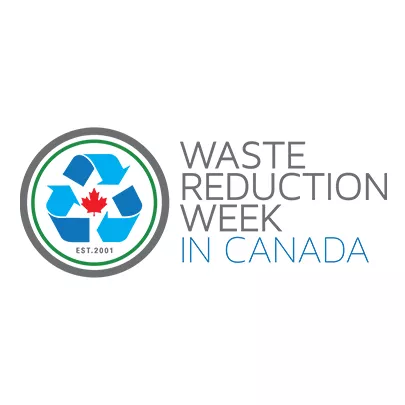
Waste Reduction Week
October 20 to 26, 2025
Since 2001 the Waste Reduction Week in Canada campaign has engaged Canadians to better understand the issues of waste and discover opportunities to reduce their impact on the environment. The City of Markham joins municipalities from coast-to-coast to celebrate and educate on waste reduction, waste diversion, and how to support a circular economy.
- Construction Monday
- Textiles Tuesday
- E-Waste Wednesday
- Plastics Thursday
- Food Waste Friday
- Share, Reuse, Repair Weekend
Follow #WasteReductionWeek throughout the week and discover the many opportunities Markham offers its residents to recycle more and reduce waste all year long.
- Construction Monday
Have you recently completed a renovation project? Drop off your leftover construction material in good condition to a local charity.
Renovation Material is not collected curbside. Broken items must be dropped off as garbage at the Earl Turcott Transfer Station. Fees apply.
If you're unsure, search up your items with the What Goes Where tool to prepare for collection day.
Why buy new? Skip the big box stores and shop reclaimed for home furnishings, appliances and renovation materials at a fraction of the price - good for your budget and the planet.
- Textiles Tuesday
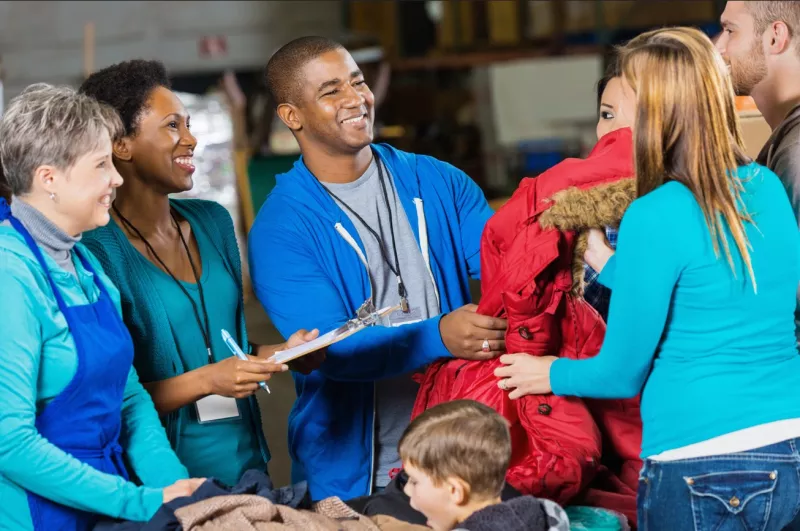
Thank you Markham residents for your ongoing community support!
Markham's Textile Recycling Program has reached over 17,236,510 kg of donated unwanted clothing and textiles; diverting valuable resources away from landfill for reuse and recycling.
The City of Markham became the first municipality in North America to ban textiles in curbside waste collection in April 2017. Since the program has grown to over 160 public access locations and 63 multi-residential properties, Markham bins are easy to find!
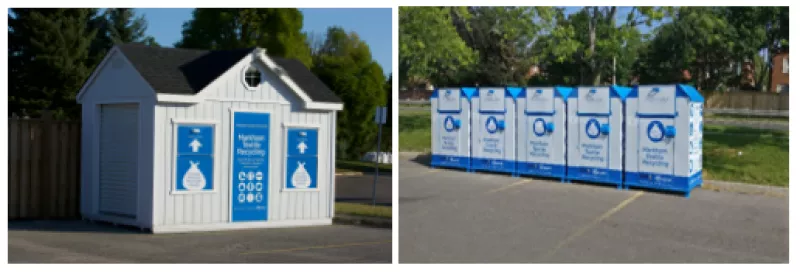
Drop off all your clean, unwanted textiles - including damaged items, even single socks and shoes!
Learn more about Markham's Textile Recycling Program.
Halloween is around the corner!
This Halloween, consider upcycling, reusing, or thrifting your costumes, accessories and decorations:
For Fall fashion finds at a fraction of the cost, shop these easy-to-find locations:
Check out more bargains with these online options:

- E-Waste Wednesday
New! eWaste Now Accepted at Markham Recycling Depots!
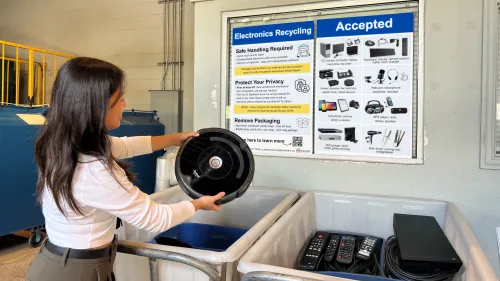
Markham Recycling Depots are now accepting your unwanted electronics and alkaline batteries for safe, responsible recycling - at no charge to you. In four short months, Markham has collected and recycled over 8,500 kg of electronics!
All electronics and batteries are hazardous and must be properly stored and kept out of landfill. Even small button batteries embedded in watches, toys and some greeting cards can pose significant fire risks if improperly disposed of.
Never place electronics and batteries in your garage or blue box.
It's important to know the difference between alkaline and lithium-ion batteries. To learn more about electronic and battery recycling.
Donate Your Electronics
Electronic equipment in good working condition should be donated to a local charity such as the Salvation Army Thrift Store or ReStore GTA. Call ahead to confirm if your item is accepted.
Before dropping off for recycling or donation, always protect your privacy first!
- Clear all personal information from computers, cell phones and electronics prior to drop off. The City of Markham is not responsible for personal information contained on your electronic devices
- Remove all batteries from electronic items and drop off at any Markham Recycling Depot
- Plastics Thursday
Skip the plastic packaging and always choose loose, fresh, unpackaged produce whenever you shop.

Opting for loose fruits and vegetables helps reduce unnecessary plastic waste and supports a more sustainable lifestyle. One of the best ways to do this is by visiting local farmers' markets. Farmers' markets offer a wide variety of seasonal, locally grown produce without plastic packaging.
By buying local, you're not only cutting down on plastic waste but also reducing the carbon footprint to transport food long-distance.
Shop fresh, local food grown right in your community!
- Main Street Markham Farmers' Market
- York Farmers' Market, Thornhill
- 19th Avenue Farmers Market
- Reesor's Farm Market
- Carma Farms
- Fresh Heads Farm & Shop
Don't forget to bring your reusable shopping bags. Small changes make a big difference. Be part of the solution to plastic pollution - refuse single-use plastics.
- Food Waste Friday
Fat, Oils & Grease (F.O.G.) Friday
Goes in the Green Bin!
When organic material goes into landfill it releases methane into the atmosphere, which is a greenhouse gas 25 times more potent than carbon dioxide. Putting your food waste in the green bin, ensures it will be turned into a valuable nutrient in compost when broken down in an anaerobic digester. This process captures the methane to produce renewable natural gas.
Protect Your Pipes!
Never pour any fats, oils or grease down the drain or toilet. Not even hot water and soap will stop F.O.G from hardening and clogging your pipes! Clogged pipes can cause flooding and sewer backups in houses and condos.

Simply wipe, scrape or pour your F.O.G. into the green bin.
- Share, Reuse, Repair Weekend
Be a circular shopper - choose access over ownership!
Now that you know it’s important to repair and reuse things as many times as possible, consider borrowing and lending items versus buying new. Did you know you can rent almost everything from a prom dress to power tools to camping gear?
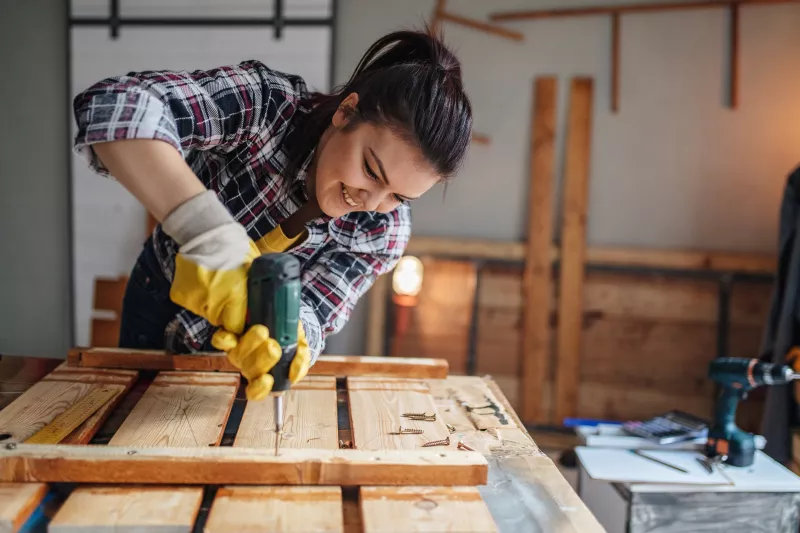
Choosing access over ownership:
- Saves money; saves storage space
- Reduces the demand to produce new things
- Increases manufacturers’ responsibility to make longer-lasting products
Instead of buying, borrow what you can
By shifting your family’s buying habits to consume less and borrow more, it makes you a circular shopper in a sharing economy.
To help you get started, check out Markham Public Libraries, they allow you to borrow more than just books! They offer items that you might only need to use once in a while, like sports equipment and hand tools.
Explore and borrow items from the Markham Public Library Lendery
See what items are available to borrow from Markham Public Library Share List
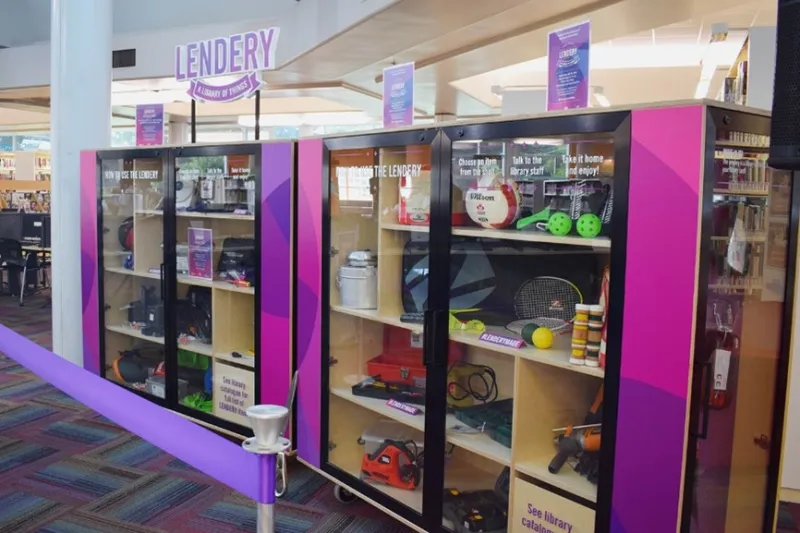
Another great way to save money, declutter your home, find things for free, and connect with your community is to take part in clothing swaps, visit consignment shops or shop and share items online.

It's Fashionable to be Sustainable!
Check out these locations for great second-hand deals:
Shift to thrift - Find more deals online
